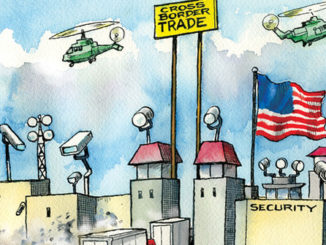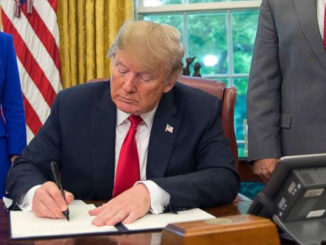
by Tim Lynch
President Trump says crime is a serious problem and that he’s going to do something about it. His first move was to nominate Alabama Senator Jeff Sessions to be the new attorney general. Sessions, a former federal prosecutor, is widely known for his “lock ‘em up” philosophy and tough stances on drugs and immigration. As the first 100 days of the Trump presidency recede into history, it is a good time to pause and assess what’s in store for the American criminal justice system.
To begin, it is very unfortunate that Trump has chosen to elevate the crime problem in the way that he has because it reinforces the mistaken idea that the federal government “oversees” our criminal justice system. In fact, the Constitution says very little about federal criminal jurisdiction. According to the constitutional text, piracy, treason, and counterfeiting are supposed to be the federal government’s concern, but not much else. The common law crimes of murder, rape, assault, and theft are to be handled by state and local governments. Of course, as the federal government grew in size and scope, it came to involve itself in a host of local matters — from schools to road maintenance to crime fighting. Although Trump has spoken of “draining the swamp” and slashing the federal budget, he not only seems uninterested in reducing the federal role in crime-fighting, but is also clearly moving to expand that role.
CRIME EXECUTIVE ORDERS
On February 9, Trump signed three executive orders relating to crime. The first order calls for the creation of a task force on crime reduction. Attorney General Sessions will appoint people to the task force and they will discuss ideas and make recommendations for Trump. A second order calls for the development of strategies to enhance the protection and safety of law enforcement officers. The third order concerns enforcing federal law against transnational criminal organizations that employ violence and derive revenue through widespread illegal conduct. Working groups will be established to make recommendations to both Sessions and Trump.
These executive orders do not, by themselves, raise any legal or constitutional problems. Sometimes presidents use executive orders to usurp the lawmaking power that is assigned to Congress. These orders do notfall into that category. There’s no new law or restriction that applies to persons in the United States that did not already exist previously. The orders are basically trying to get various offices within the government to share and coordinate information with one another.
Still, there are several reasons that supporters of limited, constitutional government ought to be concerned about the direction in which Trump and Sessions are heading. For the past 30 years, many on the right have been sounding the alarm about the growth of government and the federalization of crime and much else. In the landmark Lopez ruling in 1995, the Rehnquist Court invalidated the first federal criminal law in 60 years — the Gun-Free School Zones Act of 1990 — because it was simply beyond Congress’s power to enact. Former Reagan attorney general Edwin Meese has testified before congressional committees about the sorry shape of the federal criminal code and the need to scale it back. Trump and Sessions are going the other way. For example, the executive orders instruct the task forces and working groups to see whether existing laws are adequate and to recommend legislation defining new crimes for the president’s consideration and signature. Federal power will expand, not contract, under these orders.
Trump also caused a stir when he tweeted about the spike in homicides in Chicago. If Mayor Rahm Emanuel doesn’t turn those numbers around, the president said he’ll “send in the feds.” No one really knows what that meant, but it was the clearest indication of how Trump views his powers and responsibilities. He appears to be ready to launch a federal intervention in any American city. As one of Trump’s top legal advisers, Sessions should know better, and yet we know that he is considering reviving a 1990s initiative called Project Exile. The idea behind that program was to bring firearms charges that would normally be handled by state courts into the federal system for prosecution. Federal judges bitterly complained that Project Exile was filling their dockets up with local police business. The central problem with the program was that it assumed the federal government has general police powers instead of the limited and enumerated powers set forth in Article I, Section 8.The Constitution’s division of powers between what is properly local and what is properly national was just ignored.
MASSIVE DEPORTATIONS?
Trump believes that illegal immigrants are responsible for a lot of violent crime so he has pledged to get these “bad hombres,” as he calls them, out of the country. During the presidential campaign, he famously promised to build a great wall on the Mexican border to stem the tide of bad guys. He also promised to create a Deportation Task Force that would target “millions and millions of undocumented immigrants.” This initiative would constitute the largest police action in American history. Many deportations take place close to the border, but to accomplish Trump’s mandate for those living in the interior of the country, there will likely be scores of raids, roadblocks, arrests, and prosecutions.
There are several problems with Trump’s plan. To start with, he wants to hire 5,000 Border Patrol agents and 10,000 more Immigration and Customs Enforcement (ICE) officers. This will boomerang on the agencies and American taxpayers. Experience shows that when there is a government hiring binge, standards fall. Background checks are rushed, and so is the training for newbie agents who will be carrying guns. The agencies have already been hiring scores of people in recent years, and the problems are in plain sight. Between 2005 and 2012, a border agent was arrested for a crime every day, on average. Victims of border-agent misconduct bring lawsuits and win millions in legal settlements. Trump’s Homeland Security secretary, John Kelly, is adamant that standards will be maintained, but his promise seems untenable.
Sessions has urged federal prosecutors to use all federal laws to reduce crime and to capture illegals. Many Americans don’t think they’ll be impacted because they are, after all, citizens. They are blissfully unaware of their vulnerability. For example, one federal law says it is a crime to shield illegal immigrants. At first, that law was only used against smugglers who actively help aliens remain in the country, such as those who provide safe houses. Not any more. Prosecutors sometimes take an expansive view of the law so it could cover mild actions, such as telling an illegal to avoid certain parts of town. Consider the implications. There are an estimated 11 million illegal immigrants in the United States. If true, there must be millions of citizens and legal immigrants around them (neighbors, coworkers) who have probably violated the shielding law unknowingly.
Trump and Sessions also want local police to assist ICE investigations. Voluntary and brief courtesies have always been standard procedure in American law enforcement, but when federal authorities demand assistance, a constitutional problem arises. Under the constitutional principle of federalism, local police cannot be compelled to enforce federal laws — whether it be for tax code violators or illegal immigrants. When local police have a violent alien criminal in custody, they typically contact ICE, but some sanctuary jurisdictions decline to cooperate in petty matters involving peaceful aliens. The White House wants to withdraw federal funds from cities it considers uncooperative. Like Trump’s travel ban, this initiative will get stuck in a litigation battle and the president will likely lose.
One other unintended consequence of the planned massive police action concerns extortion. Criminal gangs can shake down peaceful, hardworking immigrants by threatening to tip off ICE agents. Crime victims and witnesses are more vulnerable to intimidation because of the rising fear of mass deportations by federal authorities. Note that the ostensible purpose of Trump’s program is to enhance public safety, but it might well have the opposite effect.
MARIJUANA POLICY
More than 20 million Americans use marijuana regularly. Millions more use it occasionally. Unlike most politicians, who take pains to avoid the subject, Attorney General Sessions is outspoken. Last year, during a Senate hearing on narcotics, he said, “Good people don’t smoke marijuana.” Sessions gets exasperated by those who lament the problem of mass incarceration in America. He sees tens of millions of people in the United States behaving badly. To stop use, he wants to see more punishment.
During his campaign, Trump said marijuana legalization was a matter that should be left to the states. Since he won the election, however, Trump has steered clear of the subject. It remains to be seen whether Trump will let Sessions loose in the marijuana area. Sessions believes that drug arrests help in the fight against violent crime, but he has that backwards. Like alcohol prohibition, drug prohibition attracts criminal gangster organizations to fight one another to control the lucrative black-market profits. During the 1920s, the news media reported on the “beer wars.” When alcohol prohibition ended and businesspeople took over alcohol production, violent crime rates declined steadily.
Although police shootings have dominated the crime news, the most dramatic change in our criminal justice system in recent years has been the legalization of marijuana. Voters in eight states — Alaska, California, Colorado, Maine, Massachusetts, Nevada, Oregon, and Washington — have now approved ballot measures to legalize pot. Millions of people are no longer subject to searches, arrests, and prosecution by local law enforcement. And police units are freed up to focus on unsolved violent crimes.
The constitutional doctrine of federalism means the states can opt out of the war on marijuana. Even though the feds can’t force local police to arrest marijuana users, Sessions might nevertheless use the Federal Bureau of Investigation and the Drug Enforcement Administration to raid marijuana firms in the eight states that have legalized it. The federal government can’t overrule what the states have opted to do, but it can interfere and impede. The feds have enough power to disrupt the legal marketplace and scare away peaceful entrepreneurs. Of course, the criminal cartels that Trump wants to target would be strengthened by such a federal crackdown.
CIVIL ASSET FORFEITURE
Police organizations are quite fond of civil asset forfeiture laws. It’s no wonder — these laws enable the police to seize property from people who have not been convicted of a crime. Because the police are invoking a civil instead of a criminal procedure, many constitutional safeguards do not apply. In some states, the presumption of innocence is completely absent. If someone’s vehicle is seized and the owner wants to get it back, he must prove his innocence in court instead of the government having to prove wrongdoing.
Police like to say that cash seizures are rarely contested in court. Strong proof, they say, that police are using the forfeiture laws against criminals, not innocent victims. A more likely explanation is that it is very hard to fight city hall. As columnist George Will has observed, civil forfeiture “forces property owners of limited means to hire lawyers and engage in protracted proceedings against a government with limitless resources just to prove their innocence.”
In addition to the relaxed legal standards, civil forfeiture laws commonly allow police departments to keep the assets they seize. The proceeds are plowed back into the budget of the police department instead of the government’s general treasury fund. That arrangement creates a financial incentive that can distort the priorities of police agents. Instead of focusing on the most dangerous criminals, the police turn their attention to asset seizures. According to the Institute for Justice, the revenue from federal forfeitures in 1986 totaled $93.7 million. By 2014, the fund had $4.5 billion from annual deposits.
The distortions and injustices spawned by these controversial laws have been widely reported and reformers are gaining traction in both the legislatures and the courts. Ohio Governor John Kasich signed a measure in January that will require a criminal conviction before the police can permanently seize property. Other reform measures have been enacted in New Mexico, Minnesota, and Mississippi. In March, Supreme Court Justice Clarence Thomas called attention to possible constitutional infirmities in the procedures and essentially invited a legal challenge that the Court could rule upon.
Alas, this is another area where Trump is moving the other way. Trump’s candidacy was supported by many police unions and they now want to be rewarded for that support. During a televised White House meeting with law enforcement officials, the president asked how he might be of help to them. One sheriff complained that a state lawmaker in Texas was drafting a bill to reform the state’s civil asset reform arrangement. The sheriff told Trump that the Mexican cartels would benefit from the measure and that police efforts would be harmed. Don’t worry, Trump assured the sheriffs, the lawmaker would be sorry because Trump would “destroy” his political career. The president later said that he was only joking about the political retaliation, but his tweet storms could undermine reform efforts at the state level.
MILITARIZED POLICING
In the summer of 2014, the Ferguson, Missouri, police department was widely criticized for its use of military gear in response to protests over the police shooting of a black teenager. Ferguson police officers looked like soldiers — helmets, camouflage, armored vehicles, and M-16s. Since the equipment and weaponry came from the Pentagon, President Barack Obama found himself on the defensive when he was asked a basic question: Why do local police departments need weapons of war? In response to the growing outcry, Obama ordered a formal review of the Pentagon program.
The transfer of armored military vehicles and weapons began well before Obama took office — even before the 9/11 terrorist attacks. The transfers are merely one aspect of a disturbing militarization trend among local civilian police departments that started to take off in the 1980s. The rationale for a Special Weapons and Tactics (SWAT) unit was to have a specialized unit available for extraordinary events, such as a hostage situation. As the years passed, several things happened. First, SWAT units started to spring up all around the country — even in small towns where there was no violent crime. Second, the mission of these units expanded to include more routine policing assignments, such as the execution of search warrants in drug cases. Third, the Pentagon made armored military vehicles and weapons available to local police departments.
When Obama’s review was complete, he only tinkered with the Pentagon program. Some outlandish weapons (at least for police work), such as bayonets and grenade launchers, were banned. And more standardized procedures and additional training were ordered for local police. Truth be told, Obama was probably informed that there was little interest in changing the giveaways. Members of Congress like to help out their local police departments — and the rank and file cops covet the military gear.
The problem is that when the police confuse their mission with the military mission, there are just too many unnecessary confrontations. A New York Times investigation in March found that paramilitary raids often led to avoidable deaths, gruesome injuries, and multimillion dollar legal settlements.
During the presidential campaign, Trump promised to rescind the 2015 Obama order. As with forfeiture, police unions are now lobbying the White House to follow through on that promise. Chuck Canterbury, national president of the Fraternal Order of Police, says, “We’re going to remind him of that promise and ask him to deliver.” Few expect Trump to break that promise and reverse course.
To conclude this overview of the criminal justice policy landscape, the first few months of the Trump presidency have been unsettling, to say the least. Trump may have good intentions, but his gut instincts in the area of criminal justice are terribly misguided. Massive deportations, marijuana raids, prop-erty seizures, and militarized policing will jolt the foundations of our constitutional republic. Criminal justice reformers will win some policy battles — especially at the state and local level, but the road ahead looks treacherous indeed.
Tim Lynch directs the Cato Institute’s Project on Criminal Justice.



